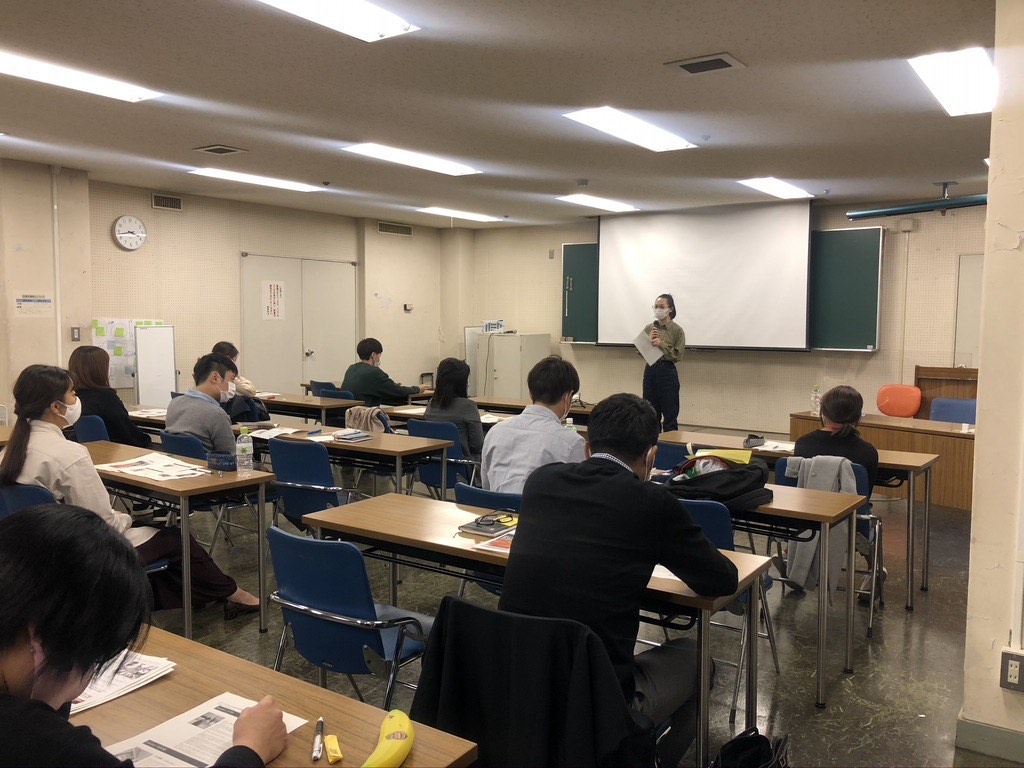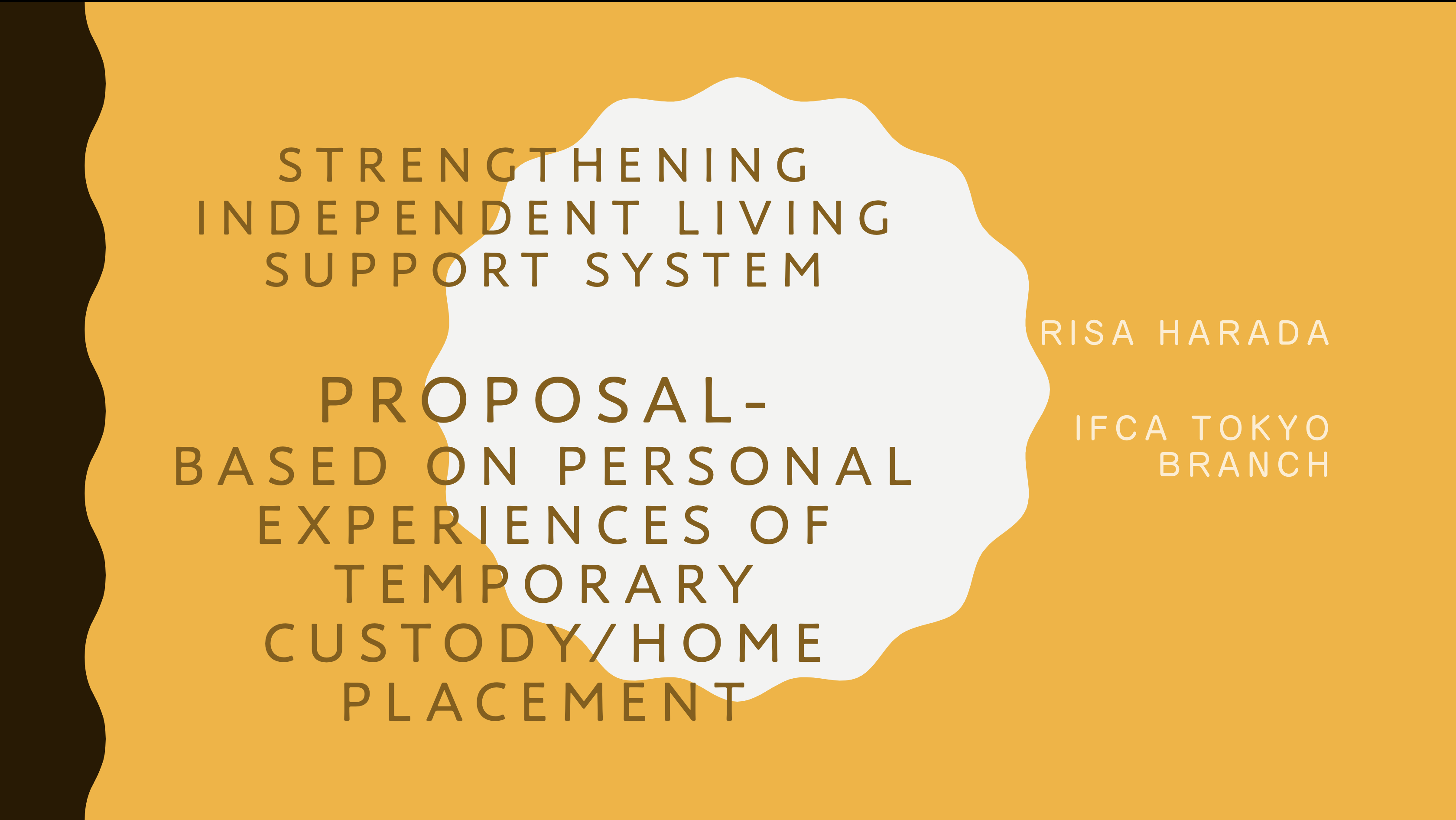Hello, this is Kosaka, I am the member of IFCA Tokyo team.
As a foster youth alumni, I had the opportunity to participate in the “Opinion Exchange Forum on Strengthening Independent Living Support for Foster Care” held at the Ministry of Health, Labour and Welfare in August with my fellow Tokyo team member, Ms. Harada.
Although the meeting was held online, we were able to hear a lot of valuable opinions from the former foster youths as well as the people working for organizations supporting the youths leaving foster care.
In this blog, I’d like to share with you some of my presentation at the opinion exchange forum.
I first shared the results of a survey conducted as part of “Project C” by IFCA. This survey was on the impact of Covid-19 on young people who experienced foster care. I’d like to express my thanks to everyone who responded to the survey.
I then shared three stories from my own experience about the challenges of becoming independent, and based on that I made requests for the greater independent living support. The requests I made were (1) a system that allows people to live safely and comfortably after leaving care, (2) a system that allows people to continue receiving their mental health care even after leaving care, and (3) promotion of foster youths engagement. I am uploading below the materials that I handed out at the opinion exchange forum, so please take a look for more details on the stories and requests.
There were eight foster youths alumni participated in the forum including us, and I was surprised that there were a lot of overlaps between our opinions and requests. In particular, many former foster youths as well as those from foster care organizations discussed the needs for mental health care. As I was listening to their presentations, there were times when I could not hold my emotion feeling how painful it must have been for them, reflecting my own experiences. Yet I was so glad to hear their valuable opinions and to be able to convey our voices directly to the Ministry of Health, Labour and Welfare.
I hope that this opinion exchange forum will lead to the strengthening of independent living support and creating a society and system in which young people leaving foster care can live peacefully.
<Handout from my presentation>
August 5th, 2020
Towards strengthening support for independent living
International Foster Care Alliance (IFCA)
Co-Director of the project team
- What is IFCA?
IFCA(International Foster Care Alliance)is Japan-U.S. collaborative organization for the foster youths established in 2013. IFCA has chapters both in the U.S and Japan; Seattle, Tokyo, Shizuoka, Fukuoka and Kansai, and works to improve child welfare on global level through the collaboration of Japanese and U.S. foster care alliance members aiming for youth engagement.
- Reference materials: “Brochure” and “Youth Publication vol. 7 ‘Our Transition Story’”
- The support required under influence of Covid-19
IFCA conducted a survey for volunteer foster youths and supporting adults on the impact of Covid-19 for young people who experienced foster care.
※See attached reference
・425 respondents /Average age of 22.8
・About 20 % of respondents found it difficult to secure food- “I have no food, I’m in trouble.”
・About 20% of respondents answered “I am currently experiencing financial difficulties”
・About 40% of respondents are having trouble accessing the necessary medical care, mental care, counseling and medicine, and are in trouble.
・About 50% of respondents experience feeling down, depressed or hopeless.
→The impact of Covid-19 is even more serious for the foster youths as they often have unstable life base. In addition, they have the substantial difficulties and psychological isolation such as facing family problems and their own history and not having anyone to rely on.
⇨ Providing individualized support and clarifying responsibilities for aftercare are needed on an individual basis.
- Challenges for my independent living
- I was worried about my relationship with my parents and if I could live safely after leaving care and being independent.
- I was already accepted to the university, but the child guidance center informed my parents which university I was going without my permission.
- As I was planning to live near my university, I was worried everyday that my parents might be waiting for me at the station or the university.
- I needed to put restrictions to access to my resident’s certificate
- The staff at my child protection facility told me so I put a restriction to access to my resident’s certificate for safety, and I have to renew it every year.
- In the first year, I was able to apply for it with a document issued by child guidance center that proves I was living under foster care. However, from the second year I could only renew it if I consulted police and had them contact and prove the public office that I was a resident who needed restriction on accessing to resident’s certificate.
- When consulted police, it was very painful for me to talk about what I experienced with my biological parents at home.
- We can only apply on weekdays when the public office is open, so it is not easy for anyone working full-time to actually make time.
- Mental health care
- I had mental health problems and received hospital visits and medical care since I was living in child protection facility.
- Even though I wanted to continue the treatment after leaving care, it was difficult to pay treatment fees so I gave up the treatment.
- As a result, my symptoms got worsened and there were times when it was difficult for me to attend university.
- Requests for strengthening support for independent living
- A system that allows people to live safely after leaving foster care
- We need a cautious procedure when sharing information of the child/youth with biological parents, so that former foster youths can live safely after leaving care.
- Information that helps former foster youths to live safely, such as restriction on accessing to resident’s certificate, should be available for all the foster youths and those who left care.
- It would be good if there is an official document or certificate that former foster youths can use continuously for several years when they apply for a restriction on access to the certificate of residence.
- A system that allows the foster youths to continue receiving mental health care after leaving care
- There are many foster youths with mental health issues, and in some cases symptoms appear or came to surface only after leaving care
- It is necessary to provide support and subsidies for receiving appropriate treatment after leaving foster care.
- As mental health treatment can take a long time, it is desirable to provide ongoing support, not just a temporary care.
- Promotion of foster youth engagement
- We request that the voice of foster youths should be included in the process of developing the system.
- Those who experienced foster care are “foster care professionals”.
- It is necessary to achieve youth engagement by making youths as committee members or constituents, rather than just by creating opportunity to hear from them.







Leave a Reply